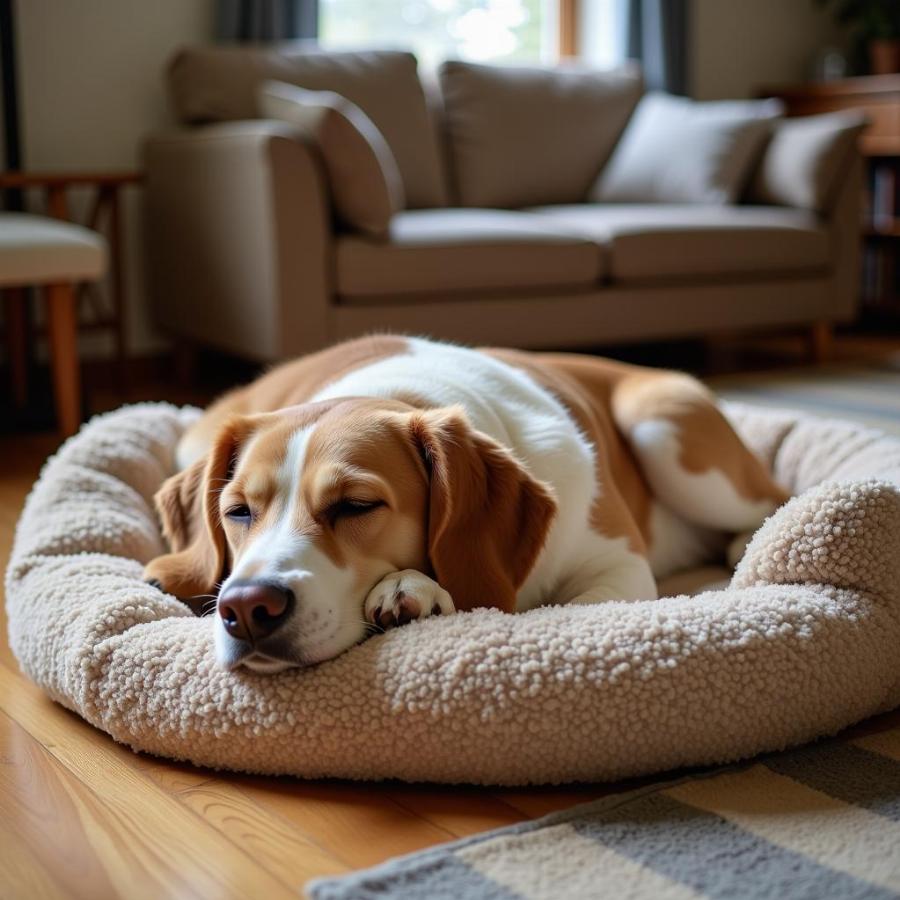Discovering your dog has peed on the bed can be frustrating. However, it’s important to remember that your furry friend isn’t acting out of spite. There’s always a reason behind this unwelcome behavior, and understanding it is key to addressing the issue. Let’s explore the common culprits behind inappropriate urination in dogs and how to prevent future accidents.
Medical Reasons for Dog Peeing on the Bed
Before assuming your dog is misbehaving, consider potential medical reasons for their accident. Several health issues can lead to inappropriate urination, including:
- Urinary Tract Infections (UTIs): Just like humans, dogs can experience the discomfort of UTIs, causing frequent urination and accidents.
- Canine incontinence: This condition, often seen in older dogs or those who have undergone surgery, can lead to involuntary urine leakage, even during sleep.
- Diabetes: Increased thirst and urination are common symptoms of diabetes in dogs.
- Kidney Disease: Kidney problems can affect your dog’s ability to control their bladder.
Expert Insight: “Always consult with your veterinarian if you suspect your dog’s inappropriate urination is due to a medical condition,” advises Dr. Emily Parker, a certified veterinarian with over 15 years of experience. “Early diagnosis and treatment are crucial for your dog’s well-being.”
Behavioral Reasons for Dog Peeing on the Bed
If your veterinarian rules out medical concerns, the next step is to consider behavioral factors. Here are some common reasons your dog might pee on the bed:
1. Anxiety and Stress
Dogs often express anxiety and stress through changes in behavior, including accidents. Separation anxiety, a new environment, loud noises, or changes in routine can trigger anxiety-induced urination.
2. Submissive Urination
Some dogs, particularly puppies or those with submissive personalities, urinate when feeling scared, excited, or unsure of themselves. This involuntary response is their way of trying to appease or defuse a perceived threat.
3. Marking Territory
While less common in spayed or neutered dogs, urine marking can still occur. Your dog might be claiming the bed as their territory, especially if it carries your scent strongly.
4. Inadequate Housetraining
If your dog is still learning the ropes of housetraining, accidents can happen. Consistency and positive reinforcement are key to successful housetraining.
How to Stop Your Dog from Peeing on the Bed
Once you’ve identified the root cause, you can take steps to prevent future accidents:
- Consult a Veterinarian: As discussed, ruling out medical conditions is crucial.
- Reinforce Housetraining: Ensure your dog has ample opportunities to go potty outside. Use positive reinforcement, such as treats and praise, when they eliminate in the designated area.
- Clean Accidents Thoroughly: Use an enzymatic cleaner specifically designed to eliminate pet odors, preventing your dog from being drawn back to the same spot.
- Manage Anxiety: Identify and minimize stressors for your dog. Provide a safe space, use calming aids if recommended by your vet, and consider training techniques like crate training or desensitization.
- Limit Access to the Bed: If possible, prevent your dog from accessing the bed until the behavior is resolved. You can use baby gates, close the bedroom door, or provide an inviting dog bed on the floor.
 Dog Sleeping in Dog Bed
Dog Sleeping in Dog Bed
Conclusion
While discovering dog pee on the bed is unpleasant, it’s solvable with the right approach. By understanding the underlying reasons for this behavior and implementing appropriate solutions, you can help your furry friend feel more secure and prevent future accidents. Remember, patience, consistency, and a loving approach are key to resolving any behavioral issues in dogs.
Need personalized advice? Contact Beaut Dogs at [email protected] for expert guidance tailored to your dog’s specific needs.
Beaut Dogs is your trusted source for all things dog-related. We’re committed to providing you with reliable information and support to help you navigate the joys and challenges of dog ownership.